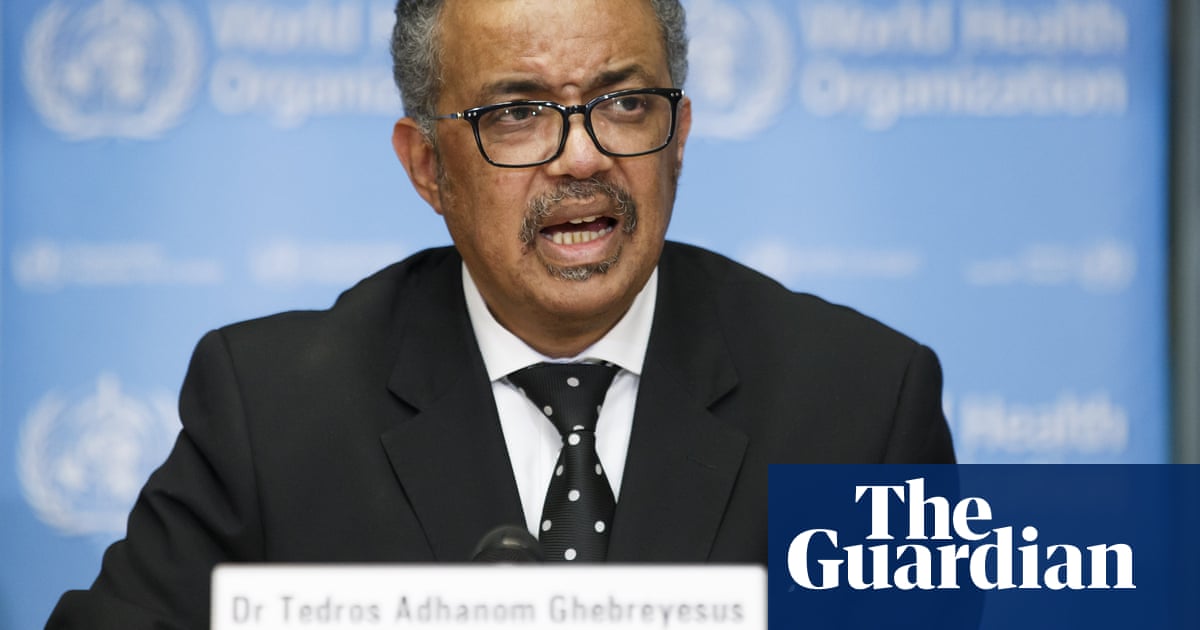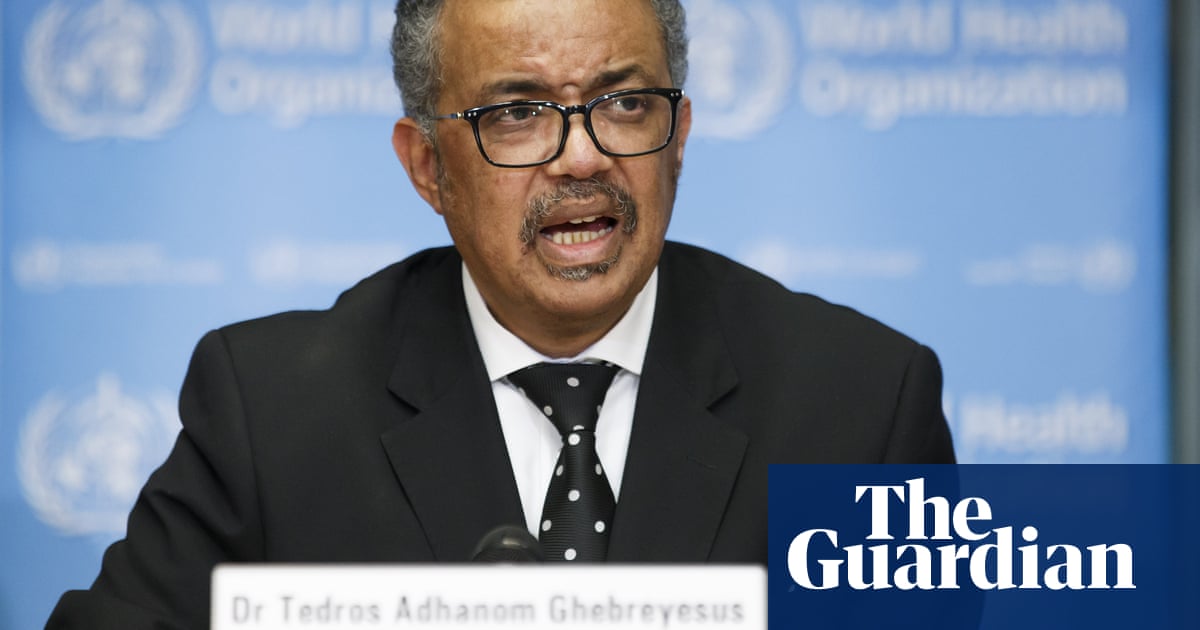Tedros Adhanom Ghebreyesus says vaccine for COVID-19 virus could be 18 months away

The new coronavirus devastating Chinese cities and spreading into many other countries around the world is a very grave threat, the director general of the World Health Organization has warned, comparing its potential with that of terrorism.
Viruses can have more powerful consequences than any terrorist action, said Dr Tedros Adhanom Ghebreyesus, after an international meeting of 400 scientists and other experts convened in Geneva to look for solutions to the crisis.
With an estimated 18 months until the first vaccine is available, we have to do everything today using available weapons, he said. The rising number of diagnoses in patients who had never visited China could be the tip of the iceberg, he added.
Tedros said the virus had been named COVID-19, explaining that it was important to avoid stigma and that other names could be inaccurate.
Under a set of guidelines issued in 2015, WHO advises against using place names such as Ebola and Zika where those diseases were first identified, and which are now inevitably linked to them in the public mind.
Peoples names usually referring to the scientists who identified the disease are also banned, as are terms that incite undue fear such as unknown or fatal, the WHO said.
The world must wake up and consider this enemy virus as public enemy number one, said Tedros.
Earlier Hong Kongs leading public health epidemiologist, one of the experts called to Geneva for the meeting, told the Guardian that the coronavirus epidemic could spread to about two-thirds of the worlds population if it could not be controlled.
Prof Gabriel Leung, the chair of public health medicine at Hong Kong University, said the overriding question was to figure out the size and shape of the iceberg. Most experts thought that each infected person would transmit the virus to about 2.5 other people. That gave an attack rate of 60-80%.
60% of the worlds population is an awfully big number, Leung told the Guardian in London, en route to Geneva on Tuesday.
The virus has killed more than 1,000 people, infected more than 42,000 and reached at least 25 countries, with the WHO declaring a global health emergency.
Even if the general fatality rate was as low as 1%, which Leung thinks is possible once milder cases are taken into account, the death toll would be massive.
Leung planned to tell the WHO meeting that the main issue was the scale of the growing worldwide epidemic, and the second priority was to find out whether the drastic measures taken by China to prevent the spread had worked because if so, other countries should think about adopting them.
The meeting brings together more than 400 researchers and national authorities, including some participating by video conference from mainland China and Taiwan. To date, China has reported 42,708 confirmed cases, including 1,017 deaths.
Epidemiologists and modellers were trying to figure out what was likely to happen, said Leung. Is 60-80% of the worlds population going to get infected? Maybe not. Maybe this will come in waves. Maybe the virus is going to attenuate its lethality because it certainly doesnt help it if it kills everybody in its path, because it will get killed as well, he said.
Experts also need to know whether restrictions in the centre of Wuhan and other cities have reduced infections. Have these massive public health interventions, social distancing and mobility restrictions worked in China? he asked. If so, how can we roll them out, or is it not possible?
There would be difficulties. Lets assume that they have worked. But how long can you close schools for? How long can you lock down an entire city for? How long can you keep people away from shopping malls? And if you remove those [restrictions], then is it all going to come right back and rage again? So those are very real questions, he said.
If Chinas lockdown has not worked, there is another unpalatable truth to face: that the coronavirus might not be possible to contain. Then the world will have to switch tracks: instead of trying to contain the virus, it will have to work to mitigate its effects.
For now, containment measures are essential. Leung said the period of time during which people were infected but showed no symptoms remained a huge problem. Quarantine was necessary, but to ensure people were not still carrying the virus when they left, everybody should ideally be tested every couple of days. If anyone within a quarantine camp or on a stricken cruise ship tested positive, the clock should be reset to 14 days more for all the others.
Q&A
How can I protect myself from the coronavirus outbreak?
The World Health Organization is recommending that people take simple precautions to reduce exposure to and transmission of the Wuhan coronavirus, for which there is no specific cure or vaccine.
The UN agencyadvisespeople to:
- Frequently wash their hands with an alcohol-based hand rub or warm water and soap
- Cover their mouth and nose with a flexed elbow or tissue when sneezing or coughing
- Avoid close contact with anyone who has a fever or cough
- Seek early medical help if they have a fever, cough and difficulty breathing, and share their travel history with healthcare providers
- Avoid direct, unprotected contact with live animals and surfaces in contact with animals when visiting live markets in affected areas
- Avoid eating raw or undercooked animal products and exercise care when handling raw meat, milk or animal organs to avoid cross-contamination with uncooked foods.
Despite a surge in sales of face masks in the aftermath of the outbreak of the coronavirus outbreak, experts are divided over whether they can prevent transmission and infection. There is some evidence to suggest that masks can help prevent hand-to-mouth transmissions, given the large number of times people touch their faces. The consensus appears to be that wearing a mask can limit but not eliminate the risks, provided they are used correctly.
The Foreign and Commonwealth Office has advised UK nationals to leave China where possible. It is also warning that travellers from Hong Kong, Japan, Macau, Malaysia, Republic of Korea, Singapore, Taiwan and Thailand who develop symptoms of cough or fever or shortness of breath within 14 days of returning the UK should contact the NHS by phone.
Some countries at risk because of the movement of people to and from China have taken precautions. On a visit to Thailand three weeks ago, Leung talked to the health minister and advised the setting up of quarantine camps, which the government has done. But other countries with links to China appear, inexplicably, to have no cases such as Indonesia. Where are they? he asked.
Tedros asked countries to be as aggressive as possible in fighting the coronavirus.
If the world doesnt want to wake up and consider the virus as public enemy number one, I dont think we will learn from our lessons, he said. We are still in containment strategy and should not allow the virus to have a space to have local transmission.
We are not defenceless, Tedros added. If we invest now we have a realistic chance of stopping this outbreak.
No specific treatment or vaccine against the virus exists. The WHO has repeatedly urged countries to share data in order to further research into the disease. That is especially true in relation to sharing of samples and sequences. To defeat this outbreak, we need open and equitable sharing, according to the principles of fairness and equity, Tedros told the scientific conference.
He said he hoped the scientists could agree a roadmap around which researchers and donors will align.
Several teams of experts in Australia, Britain, China, France, Germany and the US are racing to develop a vaccine a process that normally takes years.
Efforts to come up with a vaccine are being led by the Coalition for Epidemic Preparedness Innovations (CEPI), a body established in 2017 to finance costly biotechnology research in the wake of an Ebola outbreak in West Africa that killed more than 11,000 people.
Ultimately, however, scientists may end up in the same situation they were in during the 2002-03 outbreak of Severe Acute Respiratory Syndrome (SARS) which died out before a vaccine could be fully developed.


Recent Comments